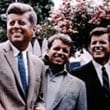In the millions of words about Ted Kennedy that will be published by week’s end, most will hail him as the conscience of American liberalism, and a few will criticize him for that and for private behavior that he himself called “indefensible.” Lost amid all the ideological attempts to either build him up or tear him down will be the senator’s most enduring legacy: his ultimate triumph over personal demons and recurring tragedies.
Few national political figures have taken up arms against such a boisterous sea of misfortunes. Yes, Kennedy was born into wealth and status. But that goes only so far. Just ask Caroline Kennedy. There is no question that expelled Harvard cheater Ted Kennedy became Sen. Kennedy by virtue of his birth. But what he did with the position entrusted to him by star-struck voters is worthy of admiration.
I don’t mean that his voting record ought to be emulated or his collected speeches memorized by school children. What he did to Robert Bork alone ought to earn him a spot in the senatorial hall of shame. What I mean is that wealth and privilege aside, Ted Kennedy faced enormous personal challenges that would have done in lesser men, and he admirably overcame them.
This is not to excuse Chappaquiddick. Were I a Massachusetts voter, I never would have voted for Ted Kennedy for that reason alone (not to mention his extreme liberalism). I am not arguing that Kennedy should have been elected to anything. The fact, however, is that he was elected, repeatedly. The voters in Massachusetts treated him like royalty, providing him with a seat in government for life. Many men would have — and have — repaid such trust with betrayal. Kennedy did the opposite.
Ted Kennedy appears to have been afflicted with a serious drinking habit. He was accused by a former staffer of having a cocaine dependency, and allegations of womanizing were legendary. Whatever the specifics, nearly everyone agrees that resisting temptations was a problem for him.
As if that weren’t enough, his first wife was an alcoholic whose addiction led to the breakdown of the marriage. His son was stricken with cancer, and of course there was the emotional toll of losing all three older brothers, one to war and two to assassins.
Add to that the pressures of celebrity and of carrying on the Kennedy legacy. In American politics, how many younger brothers have been devoured by lesser pressures than Ted Kennedy faced? Billy Carter and Roger Clinton, anyone?
Yet Ted Kennedy worked through his recurring troubles with dogged determination to leave a positive mark on his country. He might very well have worked as hard as he did because of his apparent addictions and definite errors in judgment.
Sure, it is ironic and unjust that months before Kennedy died, Mark Sanford’s political career ended because of a romantic affair that was revealed exactly 40 summers after Kennedy drove Mary Jo Kopechne to her death. We can all hope that the voters of Massachusetts grow as unforgiving of moral transgressions as the people of South Carolina seem to be.
And yet for all of his faults and misdeeds, Ted Kennedy took the tremendous gift granted him by patronage and indulgent voters and worked tirelessly to enlarge it. He could have played the self-indulgent frat boy for the whole of his life. He could have squandered every bit of his energy in the pursuit of pleasure, or slunk away and let alcohol and Chappaquiddick define his legacy.
To his credit, he did not do that. He dedicated himself to leaving the world better than he left it, and to representing the people of Massachusetts with energy and conviction. Maybe not being held accountable for Mary Jo Kopechne’s death motivated Kennedy to seek a sort of Dostoevskian accountability on his own. But unlike Raskolnikov, who ultimately confessed, Kennedy worked out his guilt through good deeds.
We cannot know for certain. But whatever the reason, Kennedy refused to give in to the demons and torments that plagued him. His lifelong struggle to defeat them for the purpose of leaving a positive imprint on his country is admirable.
What young Americans ought to take from an observation of Kennedy’s life is not a belief in the transformative power of government activism. Politically, Kennedy’s legacy cannot be written yet. Not enough time has passed to fully and accurately assess it.
Yet Kennedy’s career already has provided us with a lesson that is universal. The way he lived his life teaches a fundamental truth — that individual will has the power to overcome flaws of gene and judgment. That is Ted Kennedy’s real legacy. Regardless of one’s political views, it is a positive and enduring one.
























